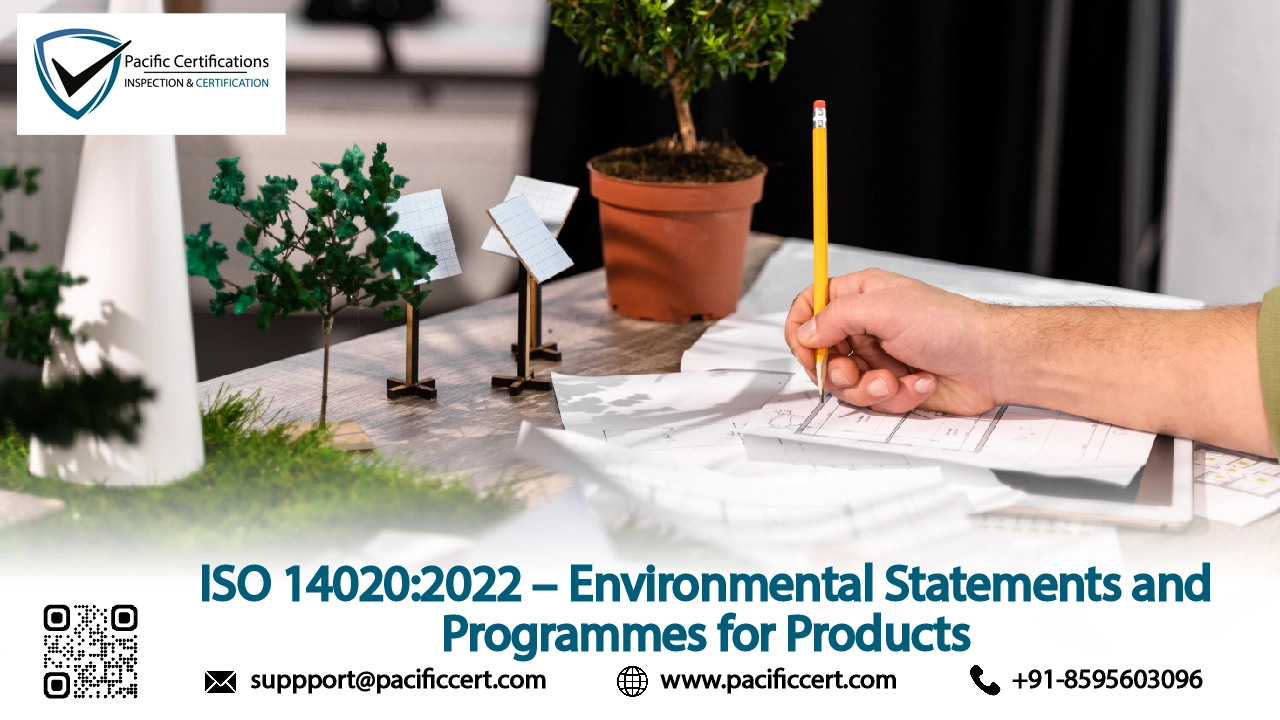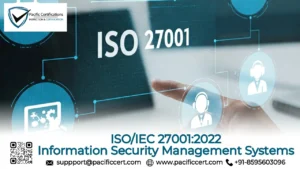What is ISO 14020?

ISO 14020:2022 is an international standard that provides guiding principles for the development and use of environmental labels and declarations for products. It establishes the foundation for clear, reliable and meaningful environmental communication between producers and consumers. The standard is part of the ISO 14000 family focused on environmental management and ensures that claims such as “environmentally friendly”, “sustainable” or “low carbon” are supported by factual, verifiable data.
The standard applies to all product-related environmental statements, whether created by manufacturers, retailers or certification programs. It ensures that information is not only accurate but also relevant, understandable and free from exaggeration or bias.
For more information, contact our team at support@pacificcert.com
Purpose
The purpose of ISO 14020 is to strengthen the integrity of environmental claims used in global commerce. In a market where eco-labelling has become a vital decision-making factor for both consumers and regulatory bodies, vague or unsupported claims can lead to mistrust and penalties. ISO 14020 addresses this issue by offering principles that ensure environmental declarations and labels are trustworthy and meaningful.

It aims to promote environmental awareness without misleading or confusing end-users. The standard encourages the development of product labels and declarations that communicate actual environmental benefits and impacts, ensuring alignment between environmental marketing practices and real-world sustainability outcomes. It supports transparent decision-making among governments, corporations and consumers alike.
Scope and Applicability
ISO 14020 is applicable across all industries, product types and geographic regions. Whether a business produces consumer electronics, food packaging, chemicals, textiles, construction materials or agricultural products, this standard helps validate the environmental messages they provide. It is relevant for both public and private entities that create or use environmental labels—be it for internal communication, business-to-business transparency or public labelling.
This standard applies equally to voluntary and mandatory labelling systems. It serves as the foundational document for other labelling-related standards in the ISO 14020 series, including ISO 14021 (self-declared claims), ISO 14024 (Type I programs), and ISO 14025 (Type III declarations). It is also valuable for companies participating in ecolabelling initiatives, environmental product declarations (EPDs), and sustainability certifications.
Key Definitions
- Environmental Label: Visual or textual information on a product that refers to its environmental performance or attributes.
- Environmental Declaration: A standardized way to present environmental data, often based on life cycle assessments.
- Type I Labels: Third-party certified eco-labels based on multiple criteria and lifecycle consideration.
- Type II Labels: Self-declared environmental claims without independent verification.
- Type III Declarations: Quantified environmental data based on ISO 14025, typically verified by a third party.
Clause-wise Structure of ISO 14020
Clause | Title | Description |
1 | Scope | Explains the purpose of standardizing environmental declarations and labels. |
2 | Normative References | Cites related standards including ISO 14021, ISO 14024, and ISO 14025. |
3 | Terms and Definitions | Establishes terminology to maintain consistency in interpretation and usage. |
4 | General Principles | Lists principles like reliability, transparency, accuracy, and relevance. |
5 | Types of Environmental Labels and Declarations | Describes Type I, II, and III labelling programs and their appropriate uses. |
6 | Criteria for Developing Labelling Programs | Outlines best practices for building credible environmental communication. |
7 | Communication Requirements | Advises on how to present environmental claims in product documentation. |
8 | Verification and Validation | Describes how claims and data should be validated internally or externally. |
9 | Alignment with Other Management Systems | Encourages integration with ISO 14001 and other sustainability frameworks. |
What are the requirements of ISO 14020?
Before applying ISO 14020 principles, organizations should understand the foundational requirements designed to ensure credibility, transparency and relevance of environmental information. These requirements promote clarity and prevent exaggerated or unsupported claims in environmental communication. Below are some of the key requirements:

- Base all claims on scientifically valid, verifiable data supported by measurable environmental attributes.
- Avoid vague or misleading terms such as “green”, “eco-safe”, or “planet-friendly” without factual support.
- Ensure transparency by disclosing the methodology used for claim substantiation.
- Differentiate between claim types, identifying whether the statement is self-declared or third-party verified.
- Provide contextual clarity to help the consumer or buyer understand the scope and meaning of the claim.
- Align with the correct label type (I, II, III) depending on the nature and depth of the declaration.
- Maintain consistency and comparability for claims across product categories and geographical markets.
- Retain documentation and audit trails to support environmental claims when reviewed by regulators or certifiers.
These requirements form the operational backbone of any environmental labelling or declaration program and help reduce the risk of reputational or legal issues.
For more information, contact our team at support@pacificcert.com.
What are the benefits of ISO 14020?
Environmental labelling, when executed correctly, can significantly improve a product’s position in the marketplace. ISO 14020 helps companies avoid reputational risks while creating reliable, standards-aligned claims. Below are some of the key benefits:

- Increased buyer confidence by supporting claims with verified environmental information
- Better access to green procurement markets due to recognized labelling principles
- Reduced legal and reputational risks from false or misleading environmental statements
- Improved internal processes for managing product-related environmental information
- Stronger alignment with ISO 14001 and other environmental standards
- Clear differentiation in sustainability-focused markets
- Supports EPDs and voluntary labelling schemes like EU Ecolabel, Blue Angel, and Energy Star
- Boosts investor and partner interest by showing environmental responsibility
Across the globe, environmental claims are under more scrutiny than ever before. Regulatory bodies in the EU, US, and Asia are introducing green claims guidelines and product labelling rules that require companies to provide data-backed environmental assertions.
Retailers and governments now demand environmental declarations that are auditable, standardized, and compliant with frameworks like ISO 14020. Sectors like textiles, electronics, and food packaging are seeing the highest uptake of ISO-aligned labelling programs.
Certification Process for ISO 14020 Implementation
Although ISO 14020 itself is not a certifiable standard, its principles are used within broader labelling programs and frameworks that may be audited or verified.
- Gap Assessment
Evaluate existing environmental claims and labels against ISO 14020 principles. - Label Type Selection
Determine whether Type I, II or III labelling is appropriate for your product. - Design of Declarations and Labels
Create or update environmental labels using valid data and ISO-compliant language. - Verification and Validation
If using Type I or III labels, conduct third-party audits and validation processes. - Integration with Management Systems
Align labelling efforts with ISO 14001 or ISO 9001 processes where applicable. - Ongoing Monitoring and Review
Continually assess labels and declarations to ensure relevance and accuracy over time.
For environmental labelling audits or related certifications, get in touch with us at support@pacificcert.com
ISO 14020 Certification Costs
Implementing ISO 14020 depends on the scale of environmental claims and the labelling systems in place. Costs are primarily associated with training staff, conducting lifecycle assessments, creating standardized labels, and potentially undergoing third-party verification for Type I or III claims. While ISO 14020 itself is not certifiable, using it within broader frameworks (like ISO 14024 or ISO 14025) will involve additional costs for verification, program development, and documentation.
Certification Timeline
The timeline for implementing ISO 14020 principles varies based on your existing sustainability communication framework. Organizations that already use ISO 14001 or EPDs can incorporate ISO 14020 principles in 1 to 2 months. New labelling initiatives or complex product declarations may take 3 to 6 months, depending on the need for verification, testing, or third-party review.
How Pacific Certifications Can Help?
Pacific Certifications supports organizations that wish to align their environmental declarations with ISO standards. While ISO 14020 itself is not certifiable, our services help businesses build reliable environmental labelling programs based on its principles.
- Label review and alignment services
- Integration with ISO 14024 and ISO 14025 certification frameworks
- Gap audits to evaluate current environmental statements
- Audit support for Type I and Type III ecolabelling systems
- Training and awareness programs for staff involved in sustainability claims
For guidance or to schedule an environmental audit, contact us at support@pacificcert.com
Training and Courses
To support adoption of ISO 14020 and related environmental labelling programs, the following training options are available:
- Lead Auditor Training – Equips professionals to conduct external third-party audits.
- Lead Implementer Training – For those responsible for planning and executing ISO 14020 implementation.
- Internal Auditor Training – Preparing internal auditors for certification audits
Pacific Certifications provides accredited training programs. If your organization is looking for ISO 14020 training, our team is equipped to help you. Contact us at support@pacificcert.com
Frequently Asked Questions (FAQs)
Is ISO 14020 certifiable?
No. It provides principles for labelling but is not certifiable on its own.
What types of organizations should use ISO 14020?
Any business making environmental claims or using ecolabels, across all sectors.
Does ISO 14020 apply to digital labelling or online product claims?
Yes. The standard applies to both physical and digital communications.
What’s the difference between ISO 14020 and ISO 14024?
ISO 14020 outlines principles. ISO 14024 provides requirements for Type I labels.
How do I ensure my claims follow ISO 14020?
Use verifiable data, specify claim scope, and maintain documentation.
Ready to get ISO 14020 certified?
Contact Pacific Certifications to begin your certification journey today!
Suggested Certifications –
Read more: Pacific Blogs






